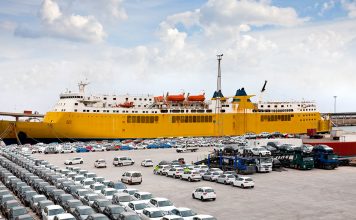 We all know that owning a car is an ongoing responsibility that requires dedication, time, effort and money. Ultimately, the lifespan and value of a car depends on the amount of care it’s given along the way. The everyday care and simple “tune-ups” can be quite easy to brush to the side in the rush of our everyday lives, but a task that we wish we would have stayed on top of by the time we’re forking over the big bucks to pay for parts and labour to fix major car problems.
We all know that owning a car is an ongoing responsibility that requires dedication, time, effort and money. Ultimately, the lifespan and value of a car depends on the amount of care it’s given along the way. The everyday care and simple “tune-ups” can be quite easy to brush to the side in the rush of our everyday lives, but a task that we wish we would have stayed on top of by the time we’re forking over the big bucks to pay for parts and labour to fix major car problems.
Personal car use is the nation’s biggest contributor to air pollution. For this reason, keeping up with the everyday general maintenance of your car is not only a benefit to you, but a huge benefit to the environment as well. The Sacramento Metropolitan Air Quality Management District and the air districts of the Sacramento region recommends these quick and easy tips to avoiding bigger car problems down the road, while reducing the amount of emissions released into the atmosphere, which is a major contributor to air pollution.
1. Drive smart
There are a number of things that you can do while driving that will save gas, cut down on the wear and tear on your car and reduce air pollution:
- Try not to brake and accelerate abruptly. The constant revving of your engine is sometimes unnecessary and only wastes gas, releasing more emissions into the atmosphere. If you’re in stop-and-go traffic, or on a long stretch of stop lights, taking it easy on the gas pedal will save you money and reduce your car’s emissions.
- Idle less. If you find yourself waiting for the train or in stopped traffic for more than 30 seconds, turning your engine off instead of idling will actually save gas and release fewer emissions than if you were to keep your car running.
- Take advantage of your cruise control. A steady speed on the freeway can save up to 33 percent of the gas you burn, while using less energy and reducing the release of emissions.
2. Drive less
Most of us have grown to be quite dependent on our cars. So much so, that we forget the simplicity of using other means of transportation which can be quite beneficial to our health. Using alternative transportation also cuts down drastically on air pollution. Here are some other options to consider:
- For close, quick errands, ride your bike. A one-hour bike ride can burn off the amount of calories that are in a quarter pound burger. If you’re going to burn something, it’s better to burn off calories that you don’t want than gas you will have to replace!
- Carpool or take public transportation. Driving less will help keep the air clean, but it will also cut back on gas expenses and keep the mileage on your car low so it will last longer and have a higher resale value. If you want to carpool, but don’t know anyone going in the same direction, you can become a member of the Sacramento Region Commuter Club at SacramentoCommuterClub.org. Thousands of its members are saving money and doing their part to Spare The Air by carpooling with others.
- Pick one day a week to avoid driving all together. Bike to work if it’s close enough. Otherwise use public transportation or carpool. Leaving your car at home one day a week will prevent 55 pounds of pollution from being emitted into our air each year while preserving the value of your car.
3. Keep up with your car’s maintenance
Making sure that your car is “up-to-speed” on its maintenance will extend its life, increases its resale value and save you money in the long run. The healthier your car is, the fewer emissions it will release into the atmosphere while on the road. Here are some things to remember:
- Get those tune-ups. Pick a day for your errands and while you’re out, find a close and convenient place to drop off your car for a quick tune-up. There are parts of your car that require maintenance or replacing, which sometimes aren’t evident until examined by a mechanic. These can include vacuum and coolant hoses, transmission belts, engine belts, air filters and staying on top of your car manufacturer’s recommended frequency of oil changes.
- Fill up in the evening, and don’t top off. Fueling your car once the sun goes down releases fewer emissions. Once your tank’s full, avoid spilling gas and “topping off” because as it evaporates, the gas turns into air pollution.
- Keep your tires properly inflated. When you stop to fill up your tank, make sure your tires have the recommended amount of air. This will minimize wear on your tires while increasing your car’s ratio of miles per gallon.
As a result of a joint community effort, high readings of air pollution have declined in the region resulting in fewer Spare The Air days. But our work isn’t done! We’re still being exposed to levels of ozone pollution that can cause long-term health effects.




![Top 20 Used Cars to Avoid Buying in Kenya – [PHOTOS]](../../../blog/wp-content/uploads/2013/11/top-used-unreliable-cars-to-avoid2-80x60.jpg)


![Here are some of the best tuned cars in kenya by state of the art garages [PHOTOS]](../../../blog/wp-content/uploads/2013/11/29402_10151301757042065_340470732_n-e1384498044289.jpg)
![Top 20 Used Cars to Avoid Buying in Kenya – [PHOTOS]](../../../blog/wp-content/uploads/2013/11/top-used-unreliable-cars-to-avoid2-100x70.jpg)





